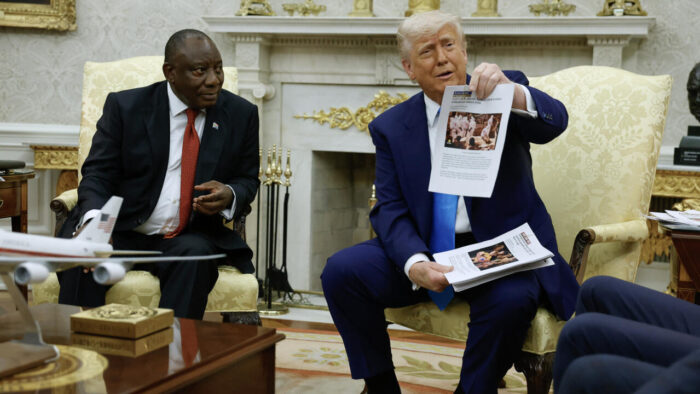By Jide Akinsemoyin
On 21 May 2025, U.S. President Donald Trump met with South African President Cyril Ramaphosa in the Oval Office at the White House in Washington, D.C. During the meeting, President Trump confronted President Ramaphosa with unverified claims about the alleged systematic killing of white farmers in South Africa, claims that President Ramaphosa and other South African officials firmly refuted as untrue.
The meeting underscored tensions between the two countries, particularly regarding South Africa’s land reform policies and the treatment of white farmers. It also revealed broader geopolitical dynamics, where domestic policies intersect with international relations, raising critical questions about the balance between national sovereignty and foreign influence.
The issue of national sovereignty versus foreign influence is not unique to African countries. President Trump’s terms in office, especially the current one, have also exposed critical questions about the true sovereignty of Western democracies amid economic interdependence, military alliances, and complex global security dynamics.
Consider European security: for nearly 80 years since World War II, Europe has relied heavily on the United States for protection, primarily through the NATO alliance. This dependence prompts a key question: can major European powers like Germany, France, and the United Kingdom truly claim sovereignty over their defence policies if their security depends so heavily on American goodwill? In other words, does sovereignty become conditional when your security is largely outsourced to a foreign power?
Trump’s presidency has laid bare the illusion of full sovereignty in today’s interconnected world. As noted, European security sovereignty has been effectively outsourced to the U.S. via NATO. Economic sovereignty is also constrained; Trump’s use of tariffs as tools of economic coercion has forced the EU to adjust its policies. Informational sovereignty is limited by Western dependence on U.S.-based technology platforms such as Google, Apple, Microsoft, Amazon, Meta, and YouTube. Even America, widely regarded as the world’s most powerful nation, capable of shaping global systems, setting norms, and defending its interests, lacks full sovereignty because it is deeply embedded within international systems, laws, and alliances.
The Pan-Africanist movement advocates for the unity, solidarity, and self-determination of African peoples worldwide, both on the continent and in the diaspora. Central to this movement is the achievement of African sovereignty, not only for individual nations but for Africa as a whole. Given how Trump’s presidency has debunked the myth of absolute sovereignty in today’s world, should Pan-Africanists reconsider their ideals and strategies accordingly?
While “sovereignty” remains the foundational principle of state authority, “influence” or “degree of influence” better reflects how that authority is projected or constrained within a globally interconnected system. From this perspective, “degree of influence” offers a more precise and strategic lens than “sovereignty” for understanding international power dynamics.
There is, however, a gap between theory and practice. In theory, all nations are sovereign under international law, which would apply to most African countries. In practice, however, power disparities mean that some countries shape global rules while others must adapt or comply. “Degree of influence” acknowledges this reality.
Advancing African sovereignty, therefore, requires African nations to increase their influence in shaping global outcomes. One way to do this is by strategically leveraging sectors where Africa already has global presence to advance interests beneficial to the continent.
African culture, especially music and dance, is an obvious and accessible asset. The global success of genres like Afrobeats, Highlife, Soukous, and Kwaito, along with artists such as Burna Boy, Wizkid, Angelique Kidjo, and Youssou N’Dour, who enjoy vast international followings, makes culture a potent vehicle for enhancing Africa’s global influence. Could these and other cultural successes be harnessed as part of a broader soft power strategy to boost Africa’s global presence?
A strong cultural footprint translates into economic opportunities, tourism, foreign investment, and political leverage. It also strengthens continental unity and identity, further enhancing Africa’s negotiating power on the world stage. However, achieving this requires African governments to be strategic and deliberate, especially in providing financial support, to ensure culture advances the continent’s broader global objectives.
Beyond culture, Africa can also maximize influence through its natural resources. The continent holds 30% of the world’s mineral reserves, including cobalt, lithium, and coltan, vital for smartphones, batteries, and electric vehicles; platinum, gold, and diamonds, essential to luxury and industrial markets; and rare earth elements critical to green technologies. Without African resources, the global transition to clean energy and tech infrastructure would face significant delays.
Africa’s environmental significance is also immense. The Congo Basin is the world’s second-largest rainforest and a crucial carbon sink. Additionally, Africa’s land and climate are vital for global food security, biodiversity, and climate stability. The world cannot effectively tackle climate change or ecological collapse without Africa’s active participation.
Finally, Africa’s young population is a global asset. With over 70% under age 30, Africa is the youngest continent worldwide. By 2050, one in four people globally will be African. This demographic represents a vast labour force and consumer base, especially significant as countries like Japan and the European Union grapple with aging populations.
Shifting from a Pan-Africanist mindset focused narrowly on achieving “sovereignty” to one that emphasizes increasing “influence” will allow Africa to engage with and shape the global system to its advantage. This means moving from a defensive posture (“Don’t interfere”) to an assertive one (“Let’s set the terms”), in which Africa has greater input in creating and enforcing global rules on trade, security, climate, technology, and finance.
Beyond formal rules, influence also encompasses the power to shape how global agendas actually unfold. Leveraging Africa’s indispensability to the global economy is a start, but not enough on its own. To convert indispensability into influence, Africa must control value chains, invest in innovation, and negotiate as a bloc rather than fragmented states.
To this end, the African Union (AU) should play a more prominent diplomatic role, speaking with one voice on issues like climate, trade, and peacekeeping. Furthermore, full implementation of the African Continental Free Trade Area (AfCFTA) is essential for Africa to emerge as a unified market, boosting its negotiation power with the EU, U.S., China, and other global players.
The time has come for meetings like the recent one in the Oval Office between Presidents Trump and Ramaphosa to be framed not as South Africa versus the United States, but as Africa (i.e., 54 united African countries) versus the United States. This shift would significantly amplify the strength and negotiating power of South Africa and all African nations alike.



